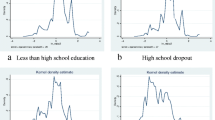Abstract
Data from the Panel Study of Income Dynamics supports predictions from the minority vulnerability thesis concerning the determinants of job layoffs among African Americans and Whites who work in upper-middle-class occupations. Specifically, after controlling for seniority, layoffs for African Americans are relatively unstructured by traditional stratification-based causal factors, namely, background socioeconomic status, human-capital credentials, and job/labor market characteristics. Analyses also indicate that racial differences in the determinants of layoffs are more pronounced in nonservice-based than service-based firms in the private sector and in the private sector relative to the public sector.
Similar content being viewed by others
References
Baldi, Stephane, and Debra McBrier 1998“Do the determinants of promotion differ for blacks and whites?” Work and Occupations 24:478–497.
Boisjoly Johanne, Greg Duncan, and Timothy Smeeding 1998“The shifting incidence of involuntary job losses from 1968 to 1992.” Industrial Relations 37:207–231.
Burstein, Paul 1985Discrimination, Jobs, and Politics. Chicago: University of Chicago Press.
Cascio, Wayne 1993“Downsizing: What do we know? What have we learned?” Academy of Management Executive 7:95– 104.
Collins, Sharon 1993“Blacks on the bubble: The vulnerability of black executives in white corporations.” Sociological Quarterly 34:429–447.
1997Black Corporate Executives: The Making and Breaking of a Black Middle Class. Philadelphia, PA: Temple University Press.
Condrey, Steven, and Robert Maranto 2001Radical Reform of the Civil Service. New York: Lexington Books.
Cornfield, Daniel 1983“Chances of layoffs in a corporation: A case study.” Administrative Science Quarterly 28:352–364.
Dobbin, Frank, John Sutton, John Meyer, and W. Richard Scott 1993“Equal opportunity law and the construction of internal labor markets.” American Sociological Review 99:396–427.
Durr, Marlese, and John Logan 1997“Racial submarkets in government employment: African American managers in New York State.” Sociological Forum 58:74–96.
Edsall, Thomas, and Mary Edsall 1991Chain Reaction: The Impact of Race, Rights, and Taxes on American Politics. New York: W. W. Norton.
Elliott, James, and Ryan Smith 2001“Ethnic matching of supervisors to subordinate work groups: Findings on “bottom-up” ascription and social closure.” Social Problems 48:258– 276.
Elvira, Marta, and Christopher Zatlick 2002“Racial composition and voluntary turnover in a multiracial setting.” Academy of Management Meetings Best Papers Proceedings 22:38– 56.
Fairlie, Robert, and Lori Kletzer 1998“Jobs lost, jobs regained: An analysis of black/white differences in job displacement in the 1980s.” Industrial Relations 37:460– 477.
Farley, Reynolds 1996The New American Reality. New York: Russell Sage Foundation.
Farley, Reynolds, and Walter Allen 1987The Quality of Life and the Color Line In America. New York: Russell Sage Foundation.
Featherman, David, and Robert Hauser 1978Opportunity and Change. New York: Academic Press.
Fernandez, John 1975Racism and Sexism in White Corporations. New York: John Wiley.
1981Black Managers in White Corporations. Lexington, MA: Lexington Books.
Golden, Miriam 1992“The politics of job loss.” American Journal of Political Science 36:408–430.
Hill, Martha 1992User’s Guide to the Panel Study of Income Dynamics. Ann Arbor: Institute for Survey Research.
Hout, Michael 1984“Occupational mobility of black men, 1962–1973.” American Sociological Review 49:308–323.
Hyllegard, David 1996Changing the Odds: Open Admissions and the Life Chances of the Disadvantaged. New Haven, CT: Yale University Press.
Hyllegard, David, and David Lavin 1992“Higher education and challenging work: Open admissions and ethnic and gender differences in job complexity.” Sociological Forum 7:239–260.
Jaffe, David 1986“The political economy of job loss in the U.S., 1970–80.” Social Problems 33:297–318.
Jaynes, Gerald, and Robin Williams 1989A Common Destiny. Washington, DC: National Academy Press.
Kluegel, James 1978“The causes and cost of racial exclusion from job authority.” American Sociological Review 43:285–301.
Kuykendall, Christine, and Rex Facer 2002“Public employment in state agencies: The elimination of the merit system.” Review of Public Personnel Administration 22:133–145.
Landry, Bart 1987The New Black Middle Class. Berkeley and Los Angeles: University of California Press.
Lawthler, Wendall 2003“Privatizing personnel: Outsourcing public sector functions.” In Steven Hays and Robert Kearney (eds.), Public Personnel Administration: Problems and Prospects: 196–208. Upper Saddle River, NJ: Prentice-Hall.
Leana, Carrie, and Daniel Feldman 1995“Finding new jobs after a plant closing: Antecedents and outcomes of the occurrence and quality of reemployment.” Human Relations 48:1381–1401.
McCune, Joseph, Richard Beatty, and Raymond Montagno 1988“Downsizing: Practices in manufacturing firms.” Human Resources Management 27:145–161.
Moore, Joan 1981“Minorities in the American class system.” Daedalus 110:275–299.
Moore, Thomas 1990“The nature and unequal incidence of job displacement costs.” Social Problems 37:230–242.
Mouw, Ted 2000“Job relocation and the racial gap in unemployment in Detroit and Chicago, 1980–1990.” American Sociological Review 65:730–753.
Mueller, Charles, Jean Wallace, and James Price 1992“Employee commitment: Resolving some issues.” Work and Occupations 19:211–236.
Neumark, David 2000On the Job: Is Long-Term Employment a Thing of the Past? New York: Russell Sage Foundation Press.
Parkin, Frank 1971Class Inequality and the Political Order. New York: Praeger.
Patillo-McCoy, Mary 1999Black Picket Fences: Privilege and Peril among the Black Middle Class. Chicago: University of Chicago Press.
Pettigrew, Thomas 1985“New black-white patterns: How best to conceptualize them.” Annual Review of Sociology 11:329– 326.
Pettigrew, Thomas, and Joanne Martin 1987“Shaping the organizational context for African American inclusion.” Journal of Social Issues 43:41–78.
Pierce, Jennifer 2001“Manufacturing consent in the “new” globalized economy.” Contemporary Sociology 30:445–446.
Pomer, Marshall 1986“Labor market structure, intragenerational mobility, and discrimination: Black male advancement out of low-paying occupations, 1962–1973.” American Sociological Review 51:650–659.
Reid, Lesley, and Beth Rubin 2003“Integrating economic dualism and labor market segmentation: The effects of race, gender, and structural location on earnings, 1974–2000.” Sociological Quarterly 44:405–432.
Reskin, Barbara 2000“The proximate causes of employment discrimination.” Contemporary Sociology 29:319–328.
Root, Kenneth 1988“Job loss: Whose fault, what remedies?” Research in Politics and Society 3:65–84.
Rosenfeld, Rachel 2000“Employment flexibility in the U.S.: Changing and maintaining gender, class, and ethnic work relations.” In Mark Western and Janeen Baxter (eds.), Reconfiguration of Class and Gender: 55–76. Palo Alto, CA: Stanford University Press.
Schervish, Paul 1986The Structural Determinants of Unemployment: Vulnerability and Power in Labor Markets. Ithaca, NY: Cornell University Press.
Smith, Ryan 1997“Race, income, and authority at work: A cross-temporal analysis of black and white men.” Social Problems 38:19–37.
2002“Race, gender, and authority in the workplace.” Annual Review of Sociology 28:509–542.
Smith, Ryan, and James Elliott 2002“Does ethnic concentration influence employees access to authority?” Social Forces 81:255–279.
Son, Soo, Suzanne Model, and Gene Fischer 1989“Polarization and progress in the black community: Earnings and status gains for young black men in the era of affirmative action.” Sociological Forum 4:309–327.
Spalter-Roth, Roberta, and Cynthia Deitch 1999“I don’t feel right-sized; I feel out of-work-sized”: Gender, race, ethnicity, and the unequal costs of displacement.” Work and Occupations 26:446–482.
Swinnerton, Kenneth, and Howard Wial 1995“Is job stability declining in the U.S. economy?” Industrial and Labor Relations Review 48:293– 304.
Thomas, Melvin 1995“Race, class, and occupation: An analysis of black and white earnings for professional and non-professional males, 1940–1990.” Research in Race and Ethnic Relations 8:139– 156.
Thomas, Melvin, Cedric Herring, and Hayward Horton 1994“Discrimination over the life-course: A synthetic cohort analysis of earnings differences between black and white males, 1940–1990.” Social Problems 41:608–628.
Tomaskovic-Devey, Donald 1993Gender and Racial Inequality at Work. Ithaca, NY: ILR Press.
Tomaskovic-Devey, Donald, and Sheryl Skaggs 1999“An establishment-level test of the statistical discrimination hypothesis.” Work and Occupations 26:422– 445.
Villemez, Wayne, and William Bridges 1994The Employment Relationship: Causes and Consequences of Modern Personnel Administration. Ithaca, NY: Cornell University Press.
Walters, John 2002Life after Civil Service Reform: The Texas, Georgia, and Florida Experiences. Arlington, VA: Endowment for the Business of Government.
Weber, Max 1968Economy and Society. New York: Vantage Press.
Wilson, George 1997“Pathways to power: Racial differences in the determinants of job authority.” Social Problems 44:38–54.
Wilson, George, Ian Sakura-Lemessy, and Jonathan West 1999“Reaching the top: Racial differences in mobility paths to upper-tier occupations.” Work and Occupations 26:165–186.
Zwerling, Craig and Hilary Silver 1992“Race and job dismissals in a federal bureaucracy.” American Sociological Review 57:651–660.
Author information
Authors and Affiliations
Corresponding author
Rights and permissions
About this article
Cite this article
Wilson, G., McBrier, D.B. Race and Loss of Privilege: African American/White Differences in the Determinants of Job Layoffs From Upper-Tier Occupations. Sociol Forum 20, 301–321 (2005). https://doi.org/10.1007/s11206-005-4102-6
Issue Date:
DOI: https://doi.org/10.1007/s11206-005-4102-6




